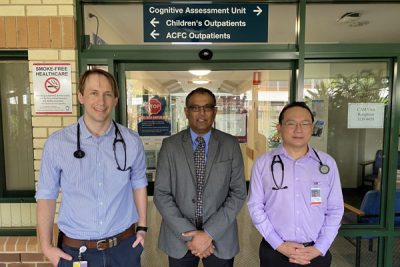
Two members of the awesome foursome, Hugh Eigeland and Lit Man Sam with TPCH geriatrician Dr Kannan Natarajan. (Absent: Samuel Tan and Sarah Cameron)
TPCH geriatricians have partnered with four hard-working medical students to conduct research aimed at helping improve patient outcomes for people with dementia.
The dynamo foursome, medical students Sarah Cameron, Lit Min Sam, Hugh Eigeland and Samuel Tan, worked with senior clinicians to produce a paper recently published in the September edition of medical journal, Aging Medicine.
UQ medical student Samuel Tan loved the opportunity to work on a hospital-level research project and the experience he gained from working within a supportive and collaborative environment.
“I was fortunate to work with one of the most capable and enthusiastic teams led by geriatricians Dr Kannan Natarajan and Dr Eamonn Eeles, my co-students, and the incredibly patient statistician Dr Karen Hay,” Sam said.
“I came to TPCH as a medical student completely foreign to research and left with an understanding of the holistic workflow from study conception, to developing results, and acting on them.”
Their research paper titled ‘A delicate balance: Psychotropic polypharmacy and anti-cholinergic use are correlated with fall incidence in Australian inpatients with dementia’ investigated the use of multiple psychotropic or moderating behaviour drugs in patients with dementia, and the risks of unrestricted prescribing.
“Patients living with dementia often present with competing priorities, which may require psychotropic medications such as anti-psychotics and benzodiazepines for symptom relief,” Sam said.
“These medications are rarely ceased after their indication has been treated and causes patients to develop medication tolerances, leading to further decreases in their function.
“A common symptom of this is falls, which we know leads to morbidity and death in older adults and helped steer the direction of our research.”
Throughout this project, it became clear to Sam and the team the importance of wearing both clinical and academic hats in medicine and they are looking forward to jumping on board future research opportunities.
“It is easy to be insulated from medicine as a student and even as a junior doctor,” Sam said.
“Research gives you the opportunity to explore these longitudinal cues and contribute holistically to medicine.
“This research journey highlighted that continued education is vital for students of any practice and translated to better clinical practice by enhancing the evidence and optimising patient safety along with quality of life.”